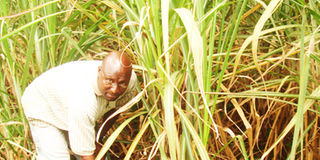Sugar price hikes hit sugarcane farmers hard

Godfrey Naitema tends his sugarcane plantation. PHOTO BY ANDREW GULUMAIRE
Even after supplying tonnes of sugarcane to Kakira Sugar Works, Godfrey Naitema marvels at the price of sugar, which is not commensurate with the money he earns from selling the cane
In 1999, Naitema, 38, left a career as a technician at Integrated Computers and Electronics in Kampala to embark on sugarcane farming in Butamira village in Buyengo sub-county, Jinja district. “I admired people who were progressing out of sugarcane growing and I also embarked on the same route. I told my colleagues that I was quitting for sugarcane planting and they could not believe me.”
The government wanted to give land in this area to Madhvani Group of Companies in the early 2000s but the move was blocked by the then area MP Frank Nabwiso.
Naitema started harvesting his sugarcane in 2001 and being in close proximity to a sugar company, he registered as an outgrower.
He had started to realise his dream but the current economic situation that is now reversing all the achievements and successes.
He started on 12 hectares of land and planted nine with sugarcane. “After the first harvest, I ploughed back all the money by renting other pieces of land.”
Now Naitema boasts of some 30 acres of sugarcane which he tills with the help of a tractor hired at Shs100,000 per acre. According to him, every acre can produce about 40 tonnes of sugarcane. Each tonne is bought on delivery at the sugar plant at Shs60,000.
Life had changed for him because with diversification, he mixed sugarcane cultivation with dairy farming by acquiring 15 head of cattle in addition to growing food crops like maize, beans and cassava. “I left three acres for growing other food and cash crops including coffee, maize, cassava, beans,” he says, “So that my family would not starve.”
Naitema points out that many sugarcane farmers may be partly responsible for the looming famine and hunger in the region as they do not leave land to cater for other crops.
On top of owning several head of cattle and a permanent house, Naitema has had a success story in providing the basic necessities to his family especially education to his five children and other relatives. However, the current economic trend is making life hard for him.
The fertility of the land would have remained a minor problem given the possibility of crop rotation to allow it regain its fertility but the application of Daps, a fertiliser, makes the business unviable. “Fertilisers are very expensive and yet if you do not apply them when planting and some urea during the infancy of the sugarcane, you may not expect yields,” he explains.
He also has to bear the cost of transporting the canes from his garden to Kakira before he is paid the Shs60,000 per tonne.
He regrets that as a sugarcane farmer who is paid such an amount, he has to buy a kilogramme of the same sugar at Shs5,000 or more. “[Kakira] should set up a special shop or supermarket where outgrowers and the community around the factory can buy sugar at a relatively cheaper price as a benefit accrued to us,” Naitema says.
But S. K. Iyenger, the secretary Kakira Sugar Works, insists that the company has not increased sugar prices but rather it is the middlemen who have hiked the prices.




